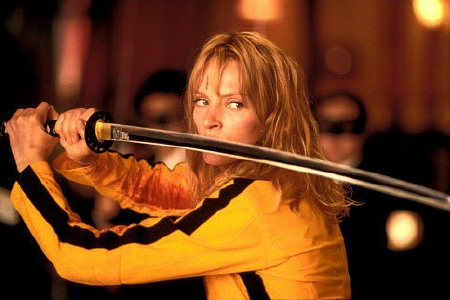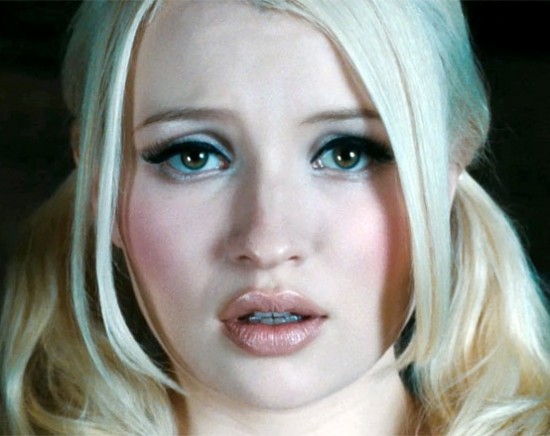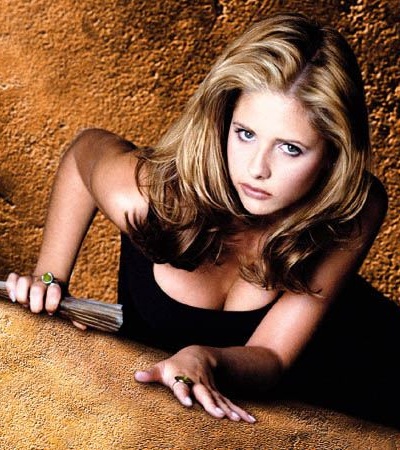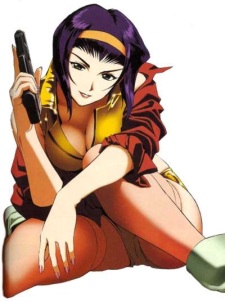On Zack Snyder's 'Sucker Punch': Why Ass-Kicking And Empowering Aren't Always The Same Thing
[The following contains major spoilers for Sucker Punch]
Is Zack Snyder's Sucker Punch exploitation or empowerment? That's the question that's been floating around since even before the film was released, and it's a pretty obvious one given that the movie was marketed entirely on the appeal of scantily clad young women wielding big ass weapons. Most of the reviews I've read of the film at least touch on the issue, and Snyder has preemptively addressed it in interviews by saying he intends the film to be empowering to women.
It's not.
 The thing is, though, that the trope of the ass-kicking hottie is nothing new. She's a common figure in anime and video games, for example, and appears in films like Kill Bill and The Girl with the Dragon Tattoo. She's not always offensive, but she's not inherently empowering, either. If she's framed in the same old male gaze, she ends up being just another variation of the same old male fantasies.
The thing is, though, that the trope of the ass-kicking hottie is nothing new. She's a common figure in anime and video games, for example, and appears in films like Kill Bill and The Girl with the Dragon Tattoo. She's not always offensive, but she's not inherently empowering, either. If she's framed in the same old male gaze, she ends up being just another variation of the same old male fantasies.
And make no mistake: Sucker Punch may star five beautiful actresses, but in actuality, it's all about the men. Men are the audience, both in real life and in the bordello fantasy universe where most of the film takes place. Men set the plot in motion, and act as villains and leaders. The girls look and act like walking male fantasies, and the movie makes sure we see them that way – by dressing them up in skin-baring outfits, lingering on their conventionally hot bodies, and oh yeah, making their attractiveness to men a huge plot point. In fact, the girls' entire escape plan hinges on one character's ability to mesmerize men with her sexy dancing.
The girls really only kick ass in their dreams — or rather, in a dream within their dream — and even there, a man is calling the shots. Only one of the five girls makes it out of the asylum alive, and that girl is Sweet Pea — the girl who feared male power the most from the very beginning. And even when she gets out, she seems meek and powerless. In the final scenes of the film, she's confronted by two policemen investigating incidents in the area. She's unable to speak up for herself, and only gets off the hook when the male bus driver (Wise Man, from the girls' fantasy-within-a-fantasy) comes to her defense.
Moreover, although Snyder says that "hopefully by the end the girls are empowered by their sexuality and not exploited," this is not at all what happens. Sexuality is treated as a weapon from the very beginning, for both genders. For the men, this means sexual assault. Though no rape actually occurs in the film, the threat of it hangs over the entire film — whether explicitly, as during the attempted rape scenes, or more subtly, as in the shots of men inappropriately and possessively leering at the girls. Later, as the girls begin to fight back, they use their sexuality as weapons as well – by using it to dupe men long enough to steal their things. And to drive the point home, whenever Baby Doll is performing her sexy, sexy dance, she jumps into a violent fantasy of explosions and gunfights.
 But the men, at least, seem to take pleasure in sex. The girls are never seen as enjoying their sexuality on their own terms. In fact, Baby Doll's face as she launches into each dance routine wears an expression of pain and humiliation. Which, seeing as every man but one in this movie is a deranged sicko, is probably part of the appeal.
But the men, at least, seem to take pleasure in sex. The girls are never seen as enjoying their sexuality on their own terms. In fact, Baby Doll's face as she launches into each dance routine wears an expression of pain and humiliation. Which, seeing as every man but one in this movie is a deranged sicko, is probably part of the appeal.
So to summarize, yes, the girls kick ass, but they only do so within the context of fighting back against men who already have power over them. Most of the girls don't win, and the one who does still needs a man to help her and look after her. In this light, Snyder's claim that Sucker Punch is empowering isn't just false, but damaging. It reframes feminism – or "female empowerment," if you'd prefer not to use the F-word – in terms of male fantasy. In other words, it's okay for ladies to kick ass and shit, as long as they do it in a way that turns men on. I'm not saying this was Snyder's conscious intention – I seriously doubt it was – but that's the message that comes across to this viewer.
Sucker Punch is straight up exploitation. There's no winking here, or clever spins, or any of that. And that's fine, to a point. Exploitation films have their own kind of value, and I get that. What bothers me isn't so much the cute girls in skimpy outfits, but Snyder's notion that women like me are supposed to find them empowering. As Jezebel's Dodai Stewart put it: "Sucker Punch is a two-hour $82 million fetish film examining how hot sad schoolgirls look when holding weapons. Snyder should have just made a porn movie — it might have been better, and it definitely would have been cheaper and more honest." What's frustrating about the sexism of Sucker Punch is that if Snyder really wanted to make a film that was more than pure exploitative fantasy, he could've easily done so. There is a way to show beautiful ladies fighting in a way that's not exploitative – Buffy the Vampire Slayer is an obvious example of a girl who regularly beats people up, but also happens to be attractive. It's also possible to take exploitation tropes and turn them on their head, as Quentin Tarantino did in Kill Bill. (Whether Kill Bill qualifies as feminist is a whole other line of discussion, but for now, suffice it to say it's miles better than Sucker Punch in that department. And in most other departments, for that matter.)
What's frustrating about the sexism of Sucker Punch is that if Snyder really wanted to make a film that was more than pure exploitative fantasy, he could've easily done so. There is a way to show beautiful ladies fighting in a way that's not exploitative – Buffy the Vampire Slayer is an obvious example of a girl who regularly beats people up, but also happens to be attractive. It's also possible to take exploitation tropes and turn them on their head, as Quentin Tarantino did in Kill Bill. (Whether Kill Bill qualifies as feminist is a whole other line of discussion, but for now, suffice it to say it's miles better than Sucker Punch in that department. And in most other departments, for that matter.)
So, what's the difference between a badass female character and a lazy stereotype of a badass female character? The answer is simple, though you wouldn't know it from the number of two-dimensional ladies Hollywood churns out every year: You give her an inner life, and you prioritize that inner life over her outer appearance. Your powerful female character doesn't have to be ugly or dressed in frumpy clothes – go ahead, put her in stilettos and a push-up bra – but if her attractiveness to men is all there is to the character, she's nothing more than an object.
 Cowboy Bebop's Faye Valentine makes a good example of how to write a conventionally sexy female character who's more than just a conventionally sexy character. Not only is she physically perfect in that way that anime women so often are, her outfit is just as skimpy as the ones in Sucker Punch, and she wields a weapon every bit as well as Baby Doll. The difference is that Faye has a distinct personality, a history, an inner life. These make her a character you care about, even while you're admiring how smoking hot she is.
Cowboy Bebop's Faye Valentine makes a good example of how to write a conventionally sexy female character who's more than just a conventionally sexy character. Not only is she physically perfect in that way that anime women so often are, her outfit is just as skimpy as the ones in Sucker Punch, and she wields a weapon every bit as well as Baby Doll. The difference is that Faye has a distinct personality, a history, an inner life. These make her a character you care about, even while you're admiring how smoking hot she is.
Likewise, though the women of Kill Bill are uncomplicated and supermodel-gorgeous, they showcase a physical and emotional power in a way that's sadly absent from Sucker Punch. Even as we're reveling in fantasies of chick fights and dragon ladies and naughty nurses, we're admiring how strong the ladies of the Deadly Viper Assassination Squad are. Though their looks are a large part of the fun in watching them, there's more to these women than surface appearances. As I pointed out earlier, Sucker Punch is only comfortable showing girls fighting when it's in a second-level fantasy, and even then they have to look hot the whole time.
Of course, you can't have your cake and eat it too. If Sucker Punch had deepened its characters, it wouldn't work quite so well as the mindless, indulgent fantasy it is now. Part of the film's appeal is undoubtedly its very brainlessness – you get to check your mind and emotions at the door, and just indulge your id for a couple of hours. You wouldn't be able to do that as easily if you had to actually invest in the film and its characters. For my money, though, a Sucker Punch that featured real characters instead vaguely drawn archetypes would've made for a far more satisfying experience.
Sucker Punch isn't the most misogynistic film out there – there are far, far worse. But it's not progressive, either, and that's why the argument that it's "empowering" bothers me so much. If you want to revel in two hours of hot chicks in skimpy clothing fighting dragons and undead Nazis and shit, that's your prerogative. Have fun with that, and enjoy it for what it is. But please don't pretend I should be celebrating it.
